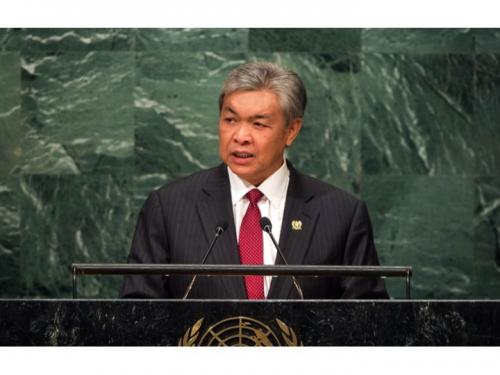Unfazed Malaysian Deputy Prime Minister

Unfazed Malaysian Deputy Prime Minister
At the General Debate at the 71st session of the United Nations General Assembly on September 24th, Malaysian Deputy Prime Minister Datuk Seri Dr. Ahmad Zahid Hamidi, gave a speech pledging Malaysia’s support for the UN’s 2030 Agenda for Sustainable Development. He also spoke about Malaysia’s economic growth, immigration, international terrorism and matters concerning the resettlement of refugees in third world countries.
Zahid delivered his speech in English and was criticized by some for his pronunciation errors. The reporter, M. Hamzah Jamaludin, alluded that because Zahid is a graduate of a religious school, rather than a university where more formal leraning could occur, he has pronunciation errors. (http://www.nst.com.my/news/2016/10/177574/zahid-his-english-im-not-dishe...) But in response to his critics, Zahid said “I’m not disheartened. I would feel embarrassed to see those who were born and raised in the country but cannot even speak Bahasa Malaysia. Some of them cannot speak the language despite their advance age, and some even have titles.” I’m curious as to who Zahid is referring to here.
While Zahid is unfazed by his critics, I found a blog that spoke about how Zahid’s “Malglish” at the UN “embarrass[ed]” Malaysia. (https://dinmerican.wordpress.com/2016/09/28/zahid-hamidi-speaks-malglish...) The author Din Merican, criticized Zahid for being a “bumbling village idiot” and advised the PM to go to “language school in Phnom Penh…to improve his English.” So here’s what the initial New Straits Times demonstrates: the tensions between being educated in a religious school and in university, being in a position of power with the ability to speak “authentic” Malaysian, and being a representative from a country where English is not the official language but having to speak it “correctly” in front of an international audience.
I looked up the General Debate on the NY Times and no real reporting was done regarding Zahid’s speech. And the articles that did cover the Assembly made no mention of anyone’s accent. Is this because the NY Times would rather just focus on the content of speeches than pronunciation or is it a diplomatic, polite thing to do?